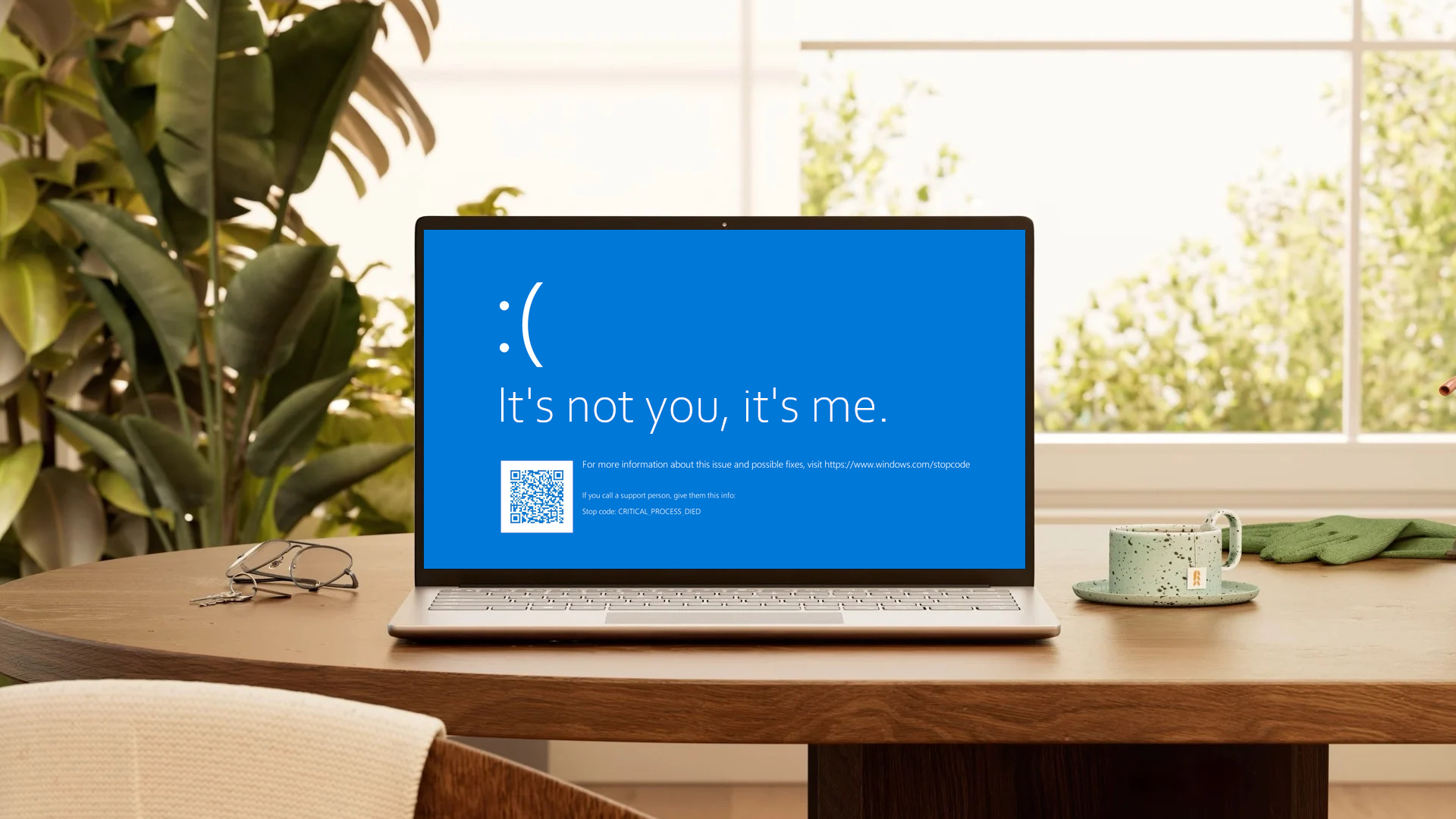Laptop Mag Verdict
The Dell XPS 13 Plus offers strong performance with a beautiful 4K OLED display, but suffers from shorter-than-average battery life and a polarizing design.
Pros
- +
Sleek, minimalist design
- +
Great performance
- +
Comfortable keyboard
Cons
- -
The design is highly polarizing
- -
Below-average battery life
Why you can trust Laptop Mag
The laptop is evolving. And at every stage, there’s a tipping point moment that pushes the industry forward from one era into the next. We may be witnessing such a moment with the Dell XPS 13 Plus. Designwise, the laptop is unlike anything we’ve seen from the company. In fact, its sleek, uber minimalist vibe is almost spartan and is definitely polarizing. Consumers will have to decide if it’s a step in the right direction or a step too far.
If the answer is the former and not the latter, the $1,900 system brings great performance by way of its Intel Core i7-1280P processor. It’s the first Dell laptop with a 28W CPU and it doesn’t disappoint. The company does what it does best, streamlining and optimizing to create one of the best portable powerhouses on the market. However, it doesn’t come without flaws as the battery life leaves much to be desired. But if you can get past that, the Dell XPS 13 Plus is one of the best laptops available.
Dell XPS 13 Plus pricing and configuration
I was transported to the future by the $1,910 model of the Dell XPS 13 Plus. The laptop is equipped with a 1.8-GHz Intel Core i7-1280P processor with 16GB of RAM, a 512GB M.2 PCIe NVMe Gen 4 SSD, an Intel Iris Xe Graphics GPU, and a 3,456 x 2,160-pixel touch OLED display with a 60Hz refresh rate.
The base model costs $1,273 and has a 3.3-GHz Intel Core i5-1240P CPU, 8GB of RAM, a 512GB M.2 PCIe NVMe Gen 4 SSD, an Intel Iris Xe Graphics GPU and a 1920 x 1200 non-touch panel with a 60Hz refresh rate.
Dell XPS 13 Plus design
Avante garde, thy name is Dell XPS 13 Plus. The laptop is like nothing you’ve ever seen from Dell. First off, the color. The Plus is an absolute dream in Graphite. The dark carbon aluminum chassis is cool to the touch and surprisingly fingerprint-resistant. The Dell emblem gleams regally in the center of the lid. The rear of the laptop slopes into a soft incline. Flip the laptop over and you’ll see a pair of rubber feet, a glossy XPS logo and three pairs of vents on either side.
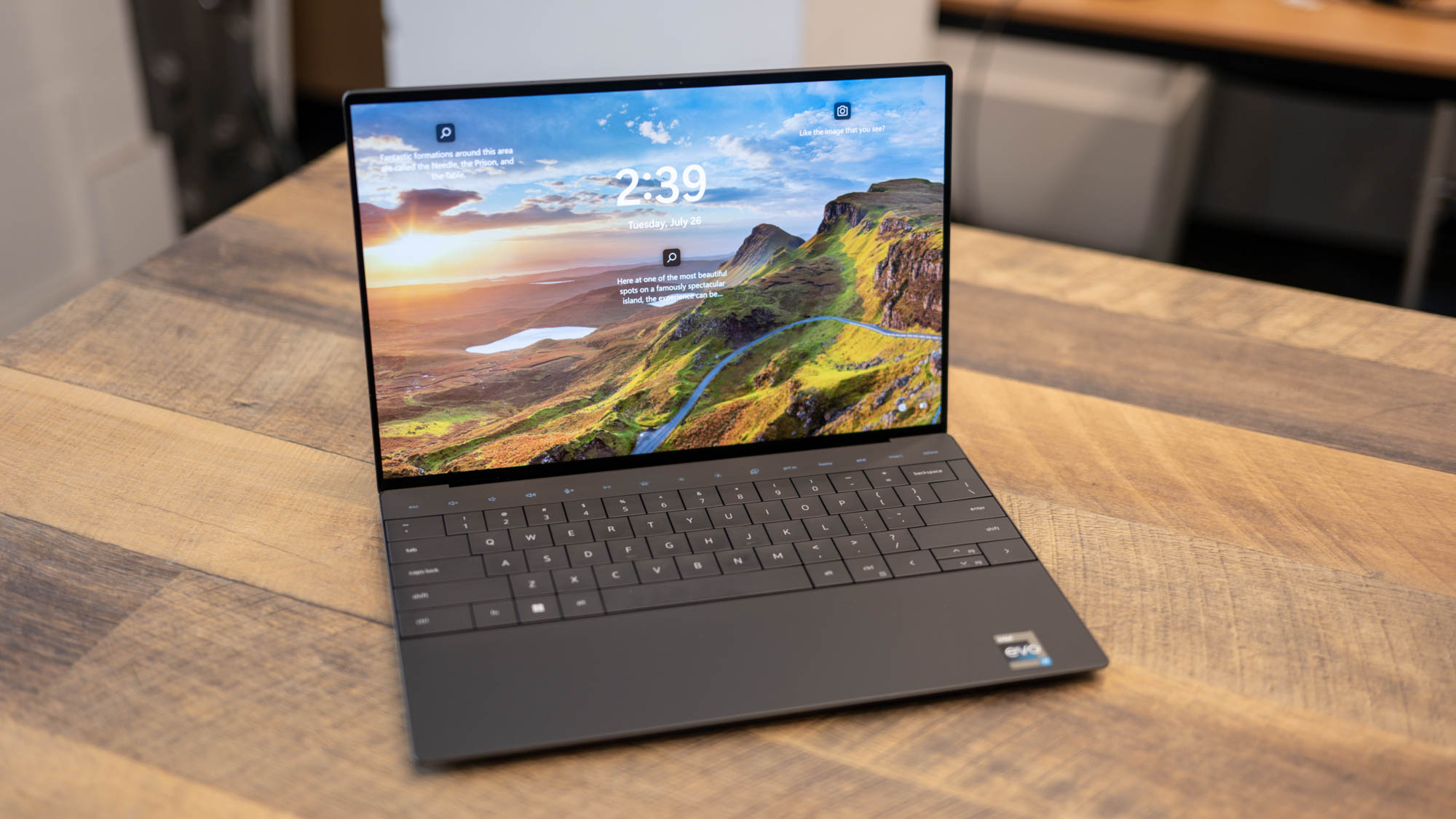
But it’s when you open the notebook that things get really interesting. There’s an edge-to-edge keyboard towards the top of the system. At the very top is a capacitive touch function row that can switch between your usual Function and media keys by pressing the fn and esc keys simultaneously.
And then there’s the touchpad — or lack thereof. No my dear readers, your eyes don’t deceive you; the touchpad is not there. Instead, you have a seamless glass palm rest. But before you panic, there actually is a touchpad hidden in the palm rest (more on that later). The power button is a small sliver next to the backspace button. The power button is doing double duty as it houses the fingerprint reader.
At 2.7 pounds, the 11.6 x 7.8 x 0.6-inch Plus is on a par with its competitors. The Acer Swift 5 (12.2 x 8.4 x 0.6 inches) and MacBook Air M2 (12 x 8.5 x 0.4 inches) match the Dell pound-for-barely-there-pound. The Microsoft Surface Laptop 4 (12.1 x 8.8 x 0.6 inches) is slightly heavier at 2.8 pounds. The MacBook Pro 13 M2 (12 x 8.4 x 0.6 inches) and Asus ZenBook 14X OLED Space Edition (12.3 x 8.7 x 0.6 inches) are slightly heavier at 3 and 3.1 pounds, respectively.
Dell XPS 13 Plus security
Whether it’s the blueprint for the better mouse trap or just some treasured photos, it’s important to protect your sensitive files. Dell gives you two methods to lock the laptop down, both of which use Windows Hello. The first is the fingerprint reader located in the power button and the second is the webcam for facial recognition. In addition to Windows Hello, the laptop also utilizes Express Sign-in, which dims the display when you’re not actively looking at it or locks the system when you walk away.
Dell XPS 13 Plus ports
This is going to be a super short section as the Dell XPS 13 Plus only has two ports –– a Thunderbolt 4 port on either side. That’s it. You don’t even get a headset jack, so you’ll definitely need a pair of wireless headphones as well as a pair of dongles and a USB-C dock.
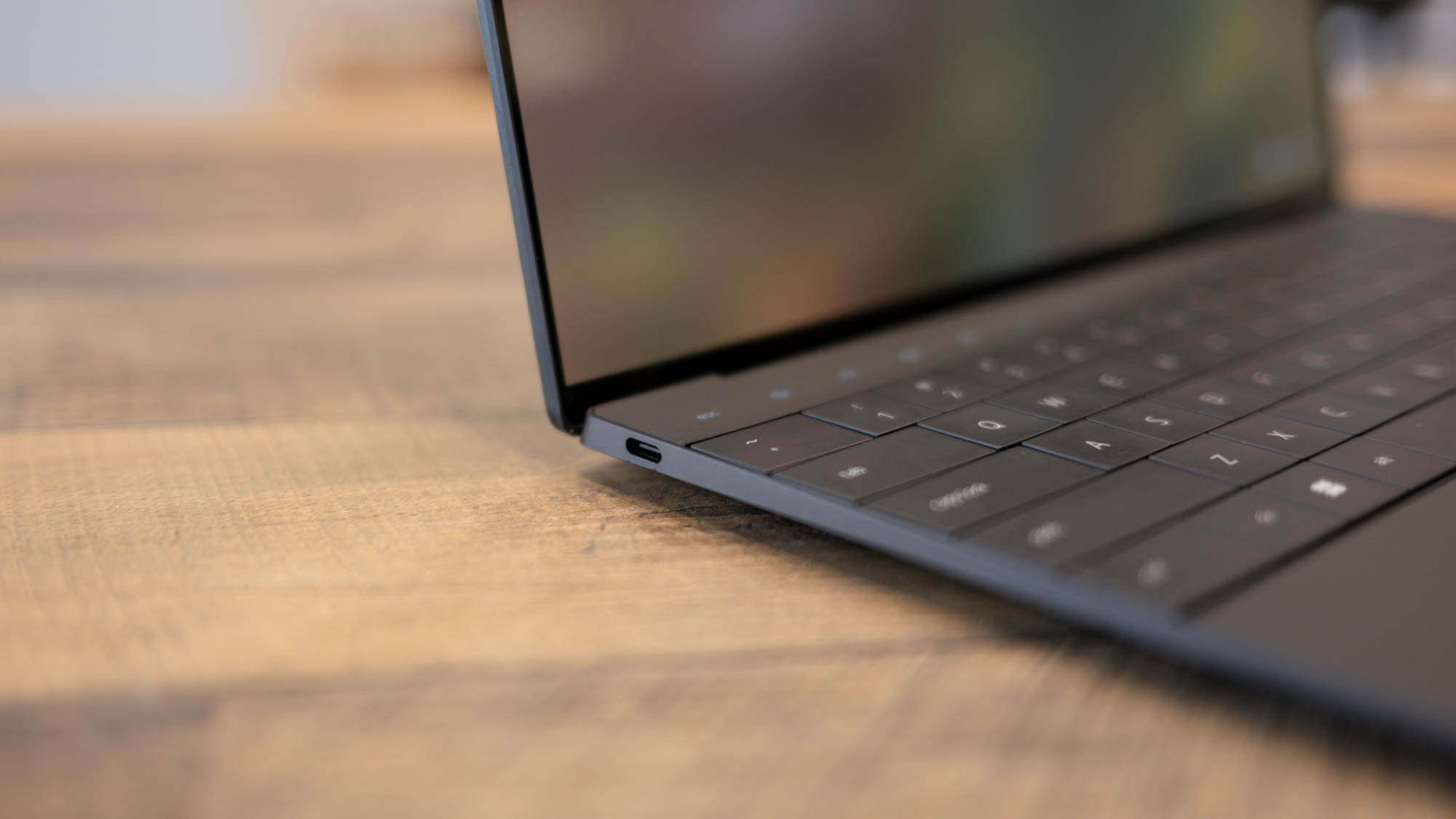
Thankfully, Dell continued its tradition of bundling a couple of dongles in with the laptop. In addition to the usual USB-C to USB-A adapter, the Plus also comes with USB-C to 3.5mm adapter.
Dell XPS 13 Plus display
The more things change, the more things stay the same. So while the Dell XPS 13 Plus has this radical new look, I’m glad the company kept the four-sided InfinityEdge display with its incredibly slim bezels. Those barely-there bezels allowed Dell to squeeze a 13.4-inch, 3,456 x 2,160-pixel OLED touch display into the incredibly sleek chassis.
I watched “The Woman King” trailer and marveled at the depth of color. Actors Viola Davis and Lashana Lynch’s beautiful brown skin glistened in the sunlight. The white cowrie shells drew your eye to Davis, which let me take in the rest of her garment with its deep blood red, cerulean, teal and gold stripes. I saw the fine details in her golden bracelet and the fine hairs in her fauxhawk.
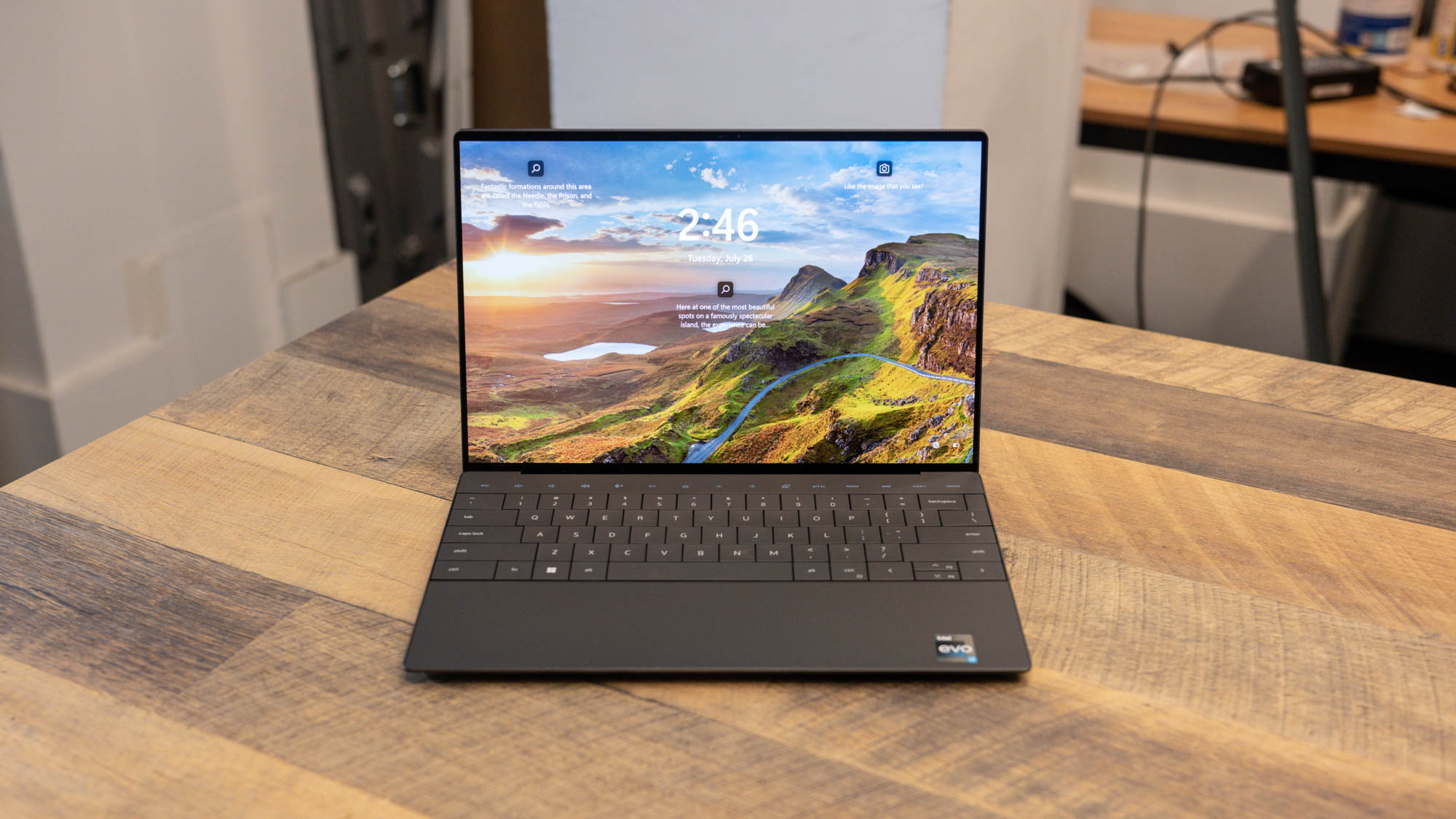
The Plus only reached 86.9% on the DCI-P3 color gamut. It’s slightly below the 89.9% premium laptop average. However, that was more than enough to beat the Surface Laptop 4 (76.7%) and the MacBook Air (75.9%). However, both the ZenBook 14X (96.4%) and Swift 5 (93.3%) were more vivid.
When we measured for brightness, the Plus averaged 366 nits, which is brighter than the Surface Laptop 4’s 349 nits. However, the 435-nit average was brighter as was the Swift 5 (457 nits), MacBook Pro (475 nits) and MacBook Air (489 nits).
The touchscreen is fast and responsive, allowing me to quickly perform a range of multitouch tasks and draw a rudimentary flower in Paint. However, I really hate smudging the display with my finger. My kingdom for a stylus.
Dell XPS 13 Plus audio
Pretty sneaky Dell. I scoured the body of the Dell XPS 13 Plus looking for the speakers only to discover that two of the quad speaker setup are hiding under the keyboard while the remainder are housed in the laptop’s base. The result is loud, sometimes distorted audio that had no problem filling my smallish living room.
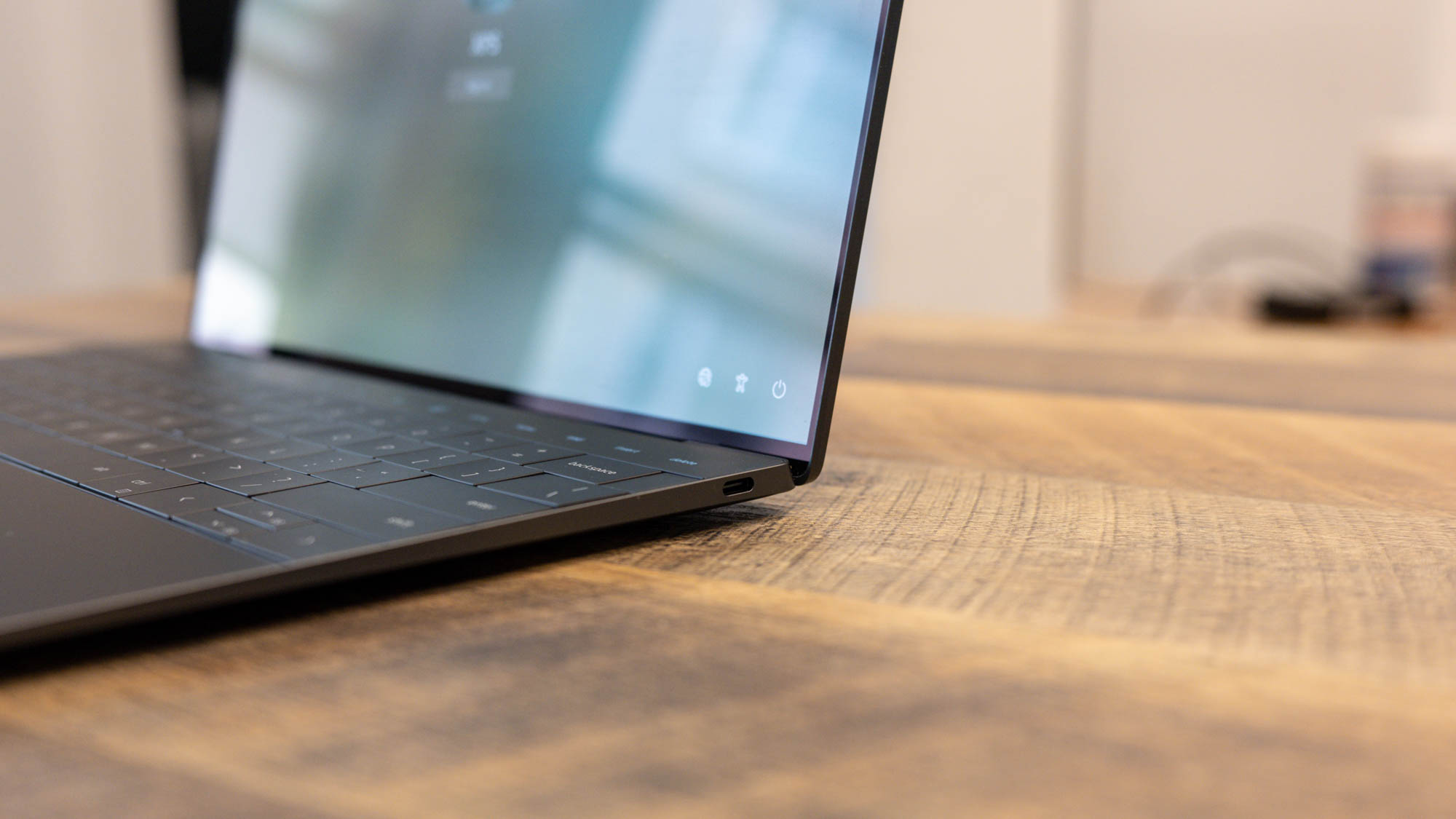
I listened to a number of tracks, including Megan Thee Stallion’s “Big Ole Freak,” which had little to no low-end. I got the best results listening to Jamiroquai’s “Time Won’t Wait” as it offered the best separation of instrumentals without sounding distorted.
In order to tamp down some of that distortion, I turned to the Waves Maxx Pro software, which offers over 10 EQ presets to achieve an optimal listening experience. After cycling through all the settings, I settled on Pop as it gave the most balanced performance.
Dell XPS 13 Plus keyboard and touchpad
I like the Dell XPS 13 Plus’s keyboard. The edge-to-edge, zero-lattice design is striking and the large keys make typing that much easier. The keys render a gentle click when typing and my fingers never bottomed out. The backlighting is just bright enough to let me work in a darkened environment.
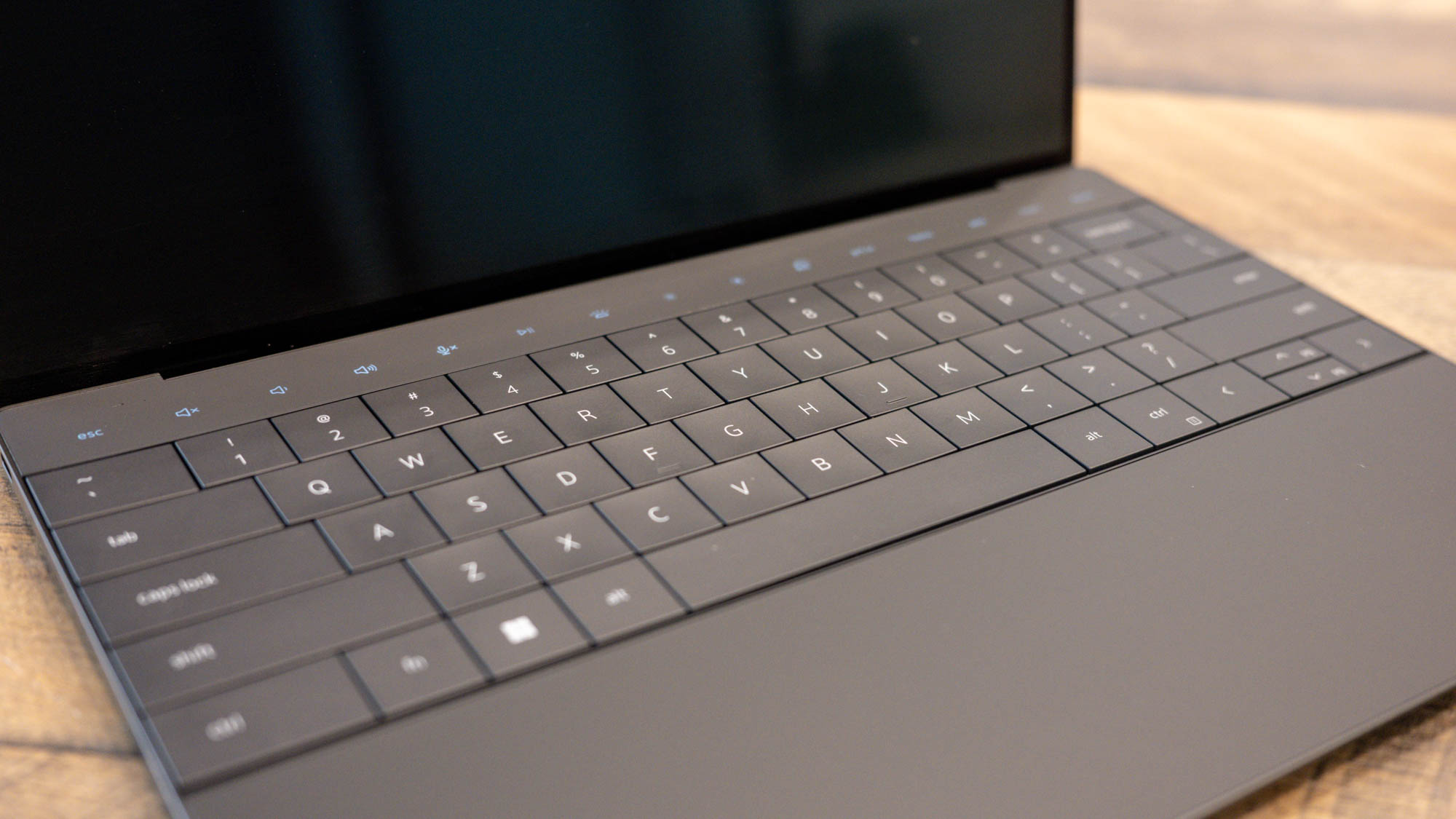
When I ran the 10FastFingers typing test, I achieved 72 words per minute, which is slightly better than my normal 70 wpm. My only other complaint about the keyboard is that the backspace key is somewhat small for my taste. It’s a minor complaint in the grand scheme of things.
So back to the invisible touchpad. Instead of the usual rectangular recess in the middle of palm rest, there’s just a smooth surface. But run your fingers along where the touchpad normally resides and you’ll feel a slight vibration and see the cursor appear. That’s right; Dell embedded a haptic touchpad into that smooth glass surface.
And it’s every bit as fast and responsive as your traditional touchpad. The touchpad’s surface area is a bit larger than your usual input device, but thanks to its strong palm rejection, the cursor never veered off into the aether. Pressing down along the bottom of the area to either the right or left elicits a soft click and mouse button functionality.
Dell XPS 13 Plus performance
What the Dell XPS 13 Plus lacks in ports it makes up for in power. The mighty minimalist comes equipped with a 1.8-GHz Intel Core i7-1280P processor with 16GB of RAM and a 512GB M.2 PCIe NVMe Gen 4 SSD. The laptop never faltered on multitasking or productivity tasks. I opened 60 Google Chrome tabs, which consisted of Google Docs, Sheets and Presentations along with Tweetdeck, Twitch, YouTube and several news sites. The Dell deftly handled the workload with no signs of latency.
The notebook continued displaying its power during our synthetic tests such as Geekbench 5.4, our overall performance test. With a score of 10,621, the Plus crushed the 6,179 premium average. None of the competing laptops stood a chance. The Swift 5 (Intel Core i7-1260P), MacBook Air and Pro with their 8-core Apple M2 CPUs reached 9,859, 8,919 and 8,911, respectively. The Surface Laptop 4, sporting an Intel Core i7-1185G7 CPU, only managed a measly 4,829. However, the ZenBook 14X (Intel Core i9-12900H CPU) was the victor with 11,142.
When we ran the HandBrake video transcoding benchmark, the Plus transcoded a 4K video to 1080p in 8 minutes and 17 seconds, roasting the 9:47 category average. The MacBook Pro saw a time of 6:51 and the Swift 5 clocked in at 7:36, the ZenBook 14X reached 7:39 while the Air hit 7:52. The Surface Laptop 4 finished at 17:01.
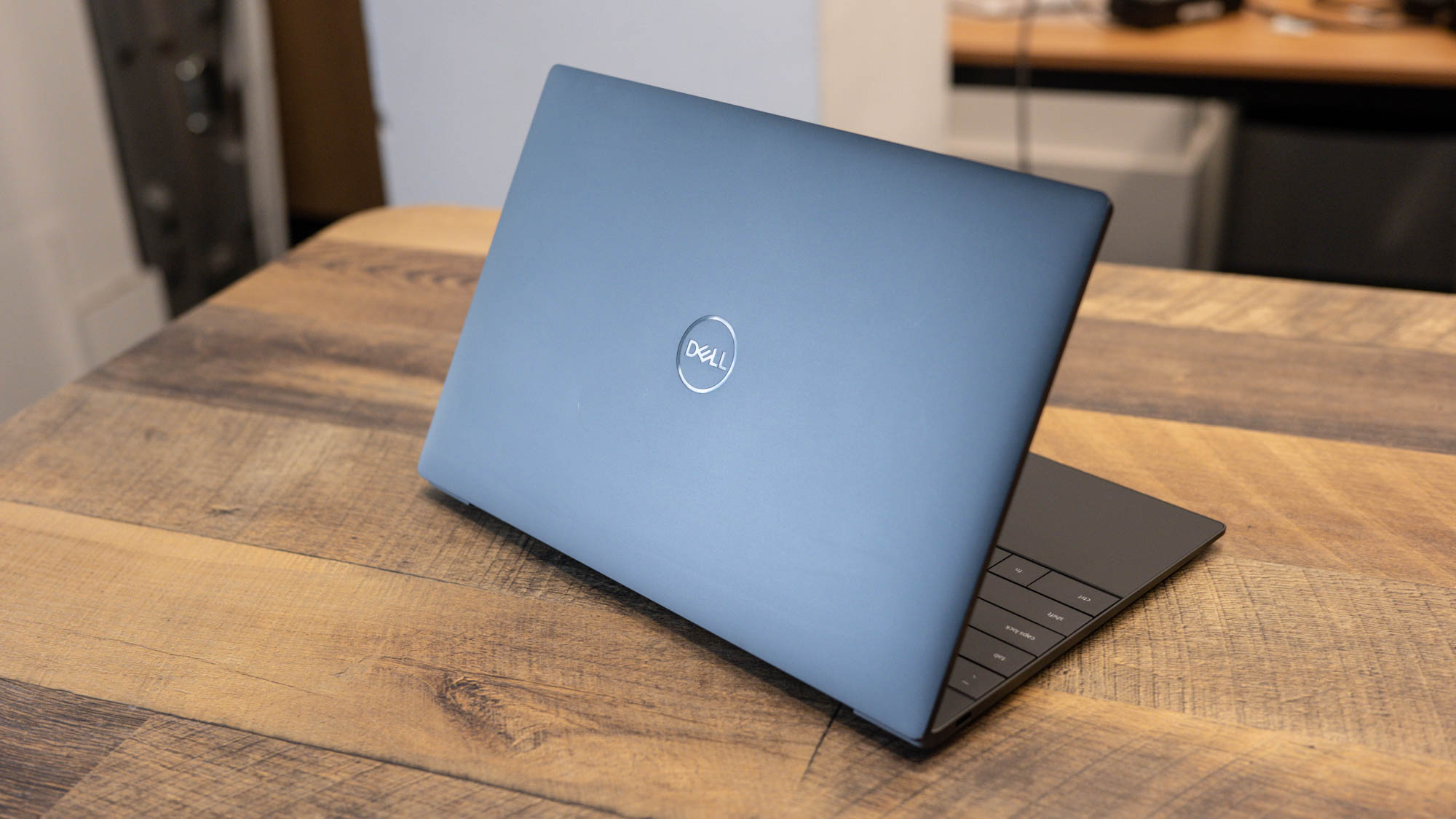
We also ran the Puget Photoshop test, which uses scripts to apply a series of filters and other adjustments to high-resolution photographs in Adobe Photoshop CC. It then assigns a score based on how well the system does. The Dell claimed a score of 670 compared to the MacBook Pro’s 817 and the Air’s 822.
During the File Transfer test, the XPS 13 Plus duplicated 25GB of multimedia files at a transfer rate of 1,502.1 megabytes per second, toppling the 1,069.5MBps category average and the Surface Laptop 4’s (512GB M.2 PCIe NVMe SSD) 562.7MBps. However, the ZenBook 14X and Swift 5 posted 1,747 and 1,673.1MBps, respectively.
We also ran the BlackMagic Disk Speed test and the Plus posted a read speed of 4,879.8MBps and a write speed of 3,638.1MBps. The MacBook Pro hit 2,794.7MBps for read and 2,953.8 write while the Air delivered 2,800.1MBps (read) and 2,210.6MBps (write).
Dell XPS 13 Plus graphics
You can’t play most AAA games with the Dell XPS 13 Plus’s integrated Intel Iris Xe Graphics, especially newer titles. But with the right games and settings, you can pull something off. The laptop achieved a score of 4,944 on the 3DMark Fire Strike test, falling short of the 9,020 average. Sporting their own Iris Xe Graphics, the Swift 5 and Surface Laptop 4 obtained 5,189 and 5,089.
On the Sid Meier’s Civilization VI benchmark, the Plus achieved 23 frames per second, which is far short of the 52-fps average. With their 10-core M2 graphics, the MacBook Pro and Air notched 51 and 40 fps, respectively. The ZenBook 14X and Swift 5 each produced 36 and 26 fps.
Dell XPS 13 Plus battery life
If there’s one shortcoming the XPS 13 Plus has, it’s battery life. The notebook lasted 7 hours and 34 minutes on the Laptop Mag Battery test, which involves continuous Web surfing over Wi-Fi at 150 nits. The Dell’s runtime is well short of the 10:11 premium laptop average. That’s better than the ZenBook 14X’s 6:02, but not enough to keep pace with the Surface Laptop 4 (10:42), Swift 5 (11:24), MacBook Air (14:06) or the MacBook Pro (18:20).
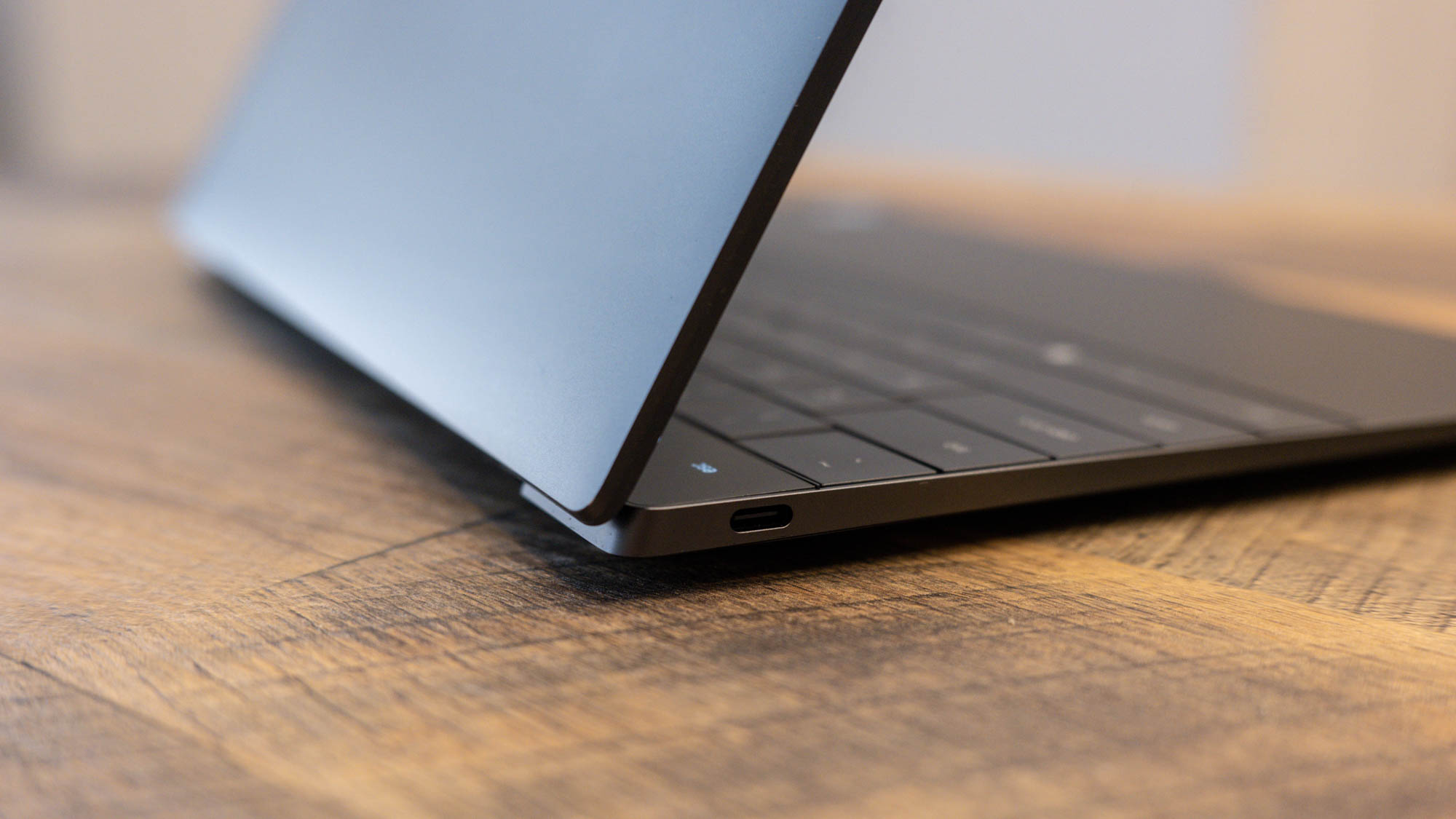
When it’s time to recharge the Dell XPS 13 Plus, its Express Charge technology will supply 80% of the laptop’s power in an hour.
Dell XPS 13 Plus heat
I’ve mentioned some of the things the XPS 13 Plus has shed, now it’s time to talk about something it’s gained –– larger fans. By ditching the traditional Fn row, Dell managed to fit larger fans that the company states delivers 55% more airflow. We put it to the test and ran a fullscreen video for 15 minutes and measured specific points on the laptop’s chassis.
The touchpad reached a cool 85 degrees Fahrenheit. The center of the keyboard reached 90 degrees while the undercarriage hit 103 degrees, which exceeds our 95-degree comfort threshold. However, I used the notebook in my lap for over two hours with no ill effect.
Dell XPS 13 Plus webcam
While I would prefer a 1080p integrated webcam, I’d be a hater if I didn’t commend the Dell XPS 13 Plus’s 720p shooter. Despite the lower resolution, I can’t deny that it does an amazing job reproducing color, especially on my warm chocolate complexion. It also accurately captured the purple, green, blue and pink in my locs as well as the cream and metallic gold of my dress.
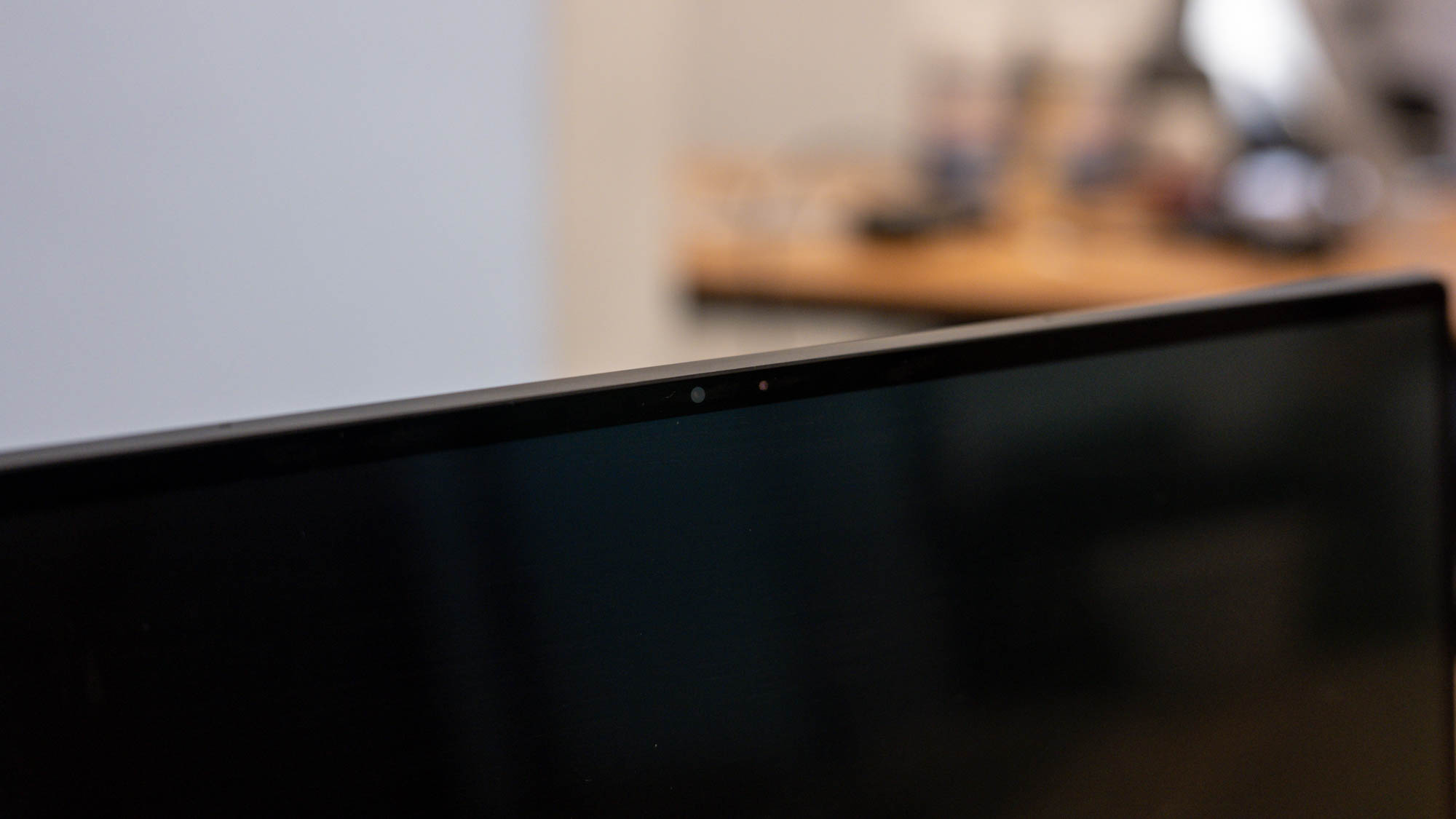
Although there’s a fair amount of visual noise, you can plainly see the ruffles in my dress and the coils in my barrel rolls. If you’re looking for higher quality images, check out our best webcam page.
Dell XPS 13 Plus software
Dell preinstalled several branded pieces of software including Dell Digital Delivery, which lets you purchase software when you’re buying your notebook. When you receive the laptop, everything you bought will be there, waiting to be installed. You also get Alienware Update, which keeps all your pertinent software up to date with the latest drivers and updates.
Useful third-party software includes Killer Intelligence Center, which gives you the power to prioritize network bandwidth. You also get a free year of McAfee LiveSafe.
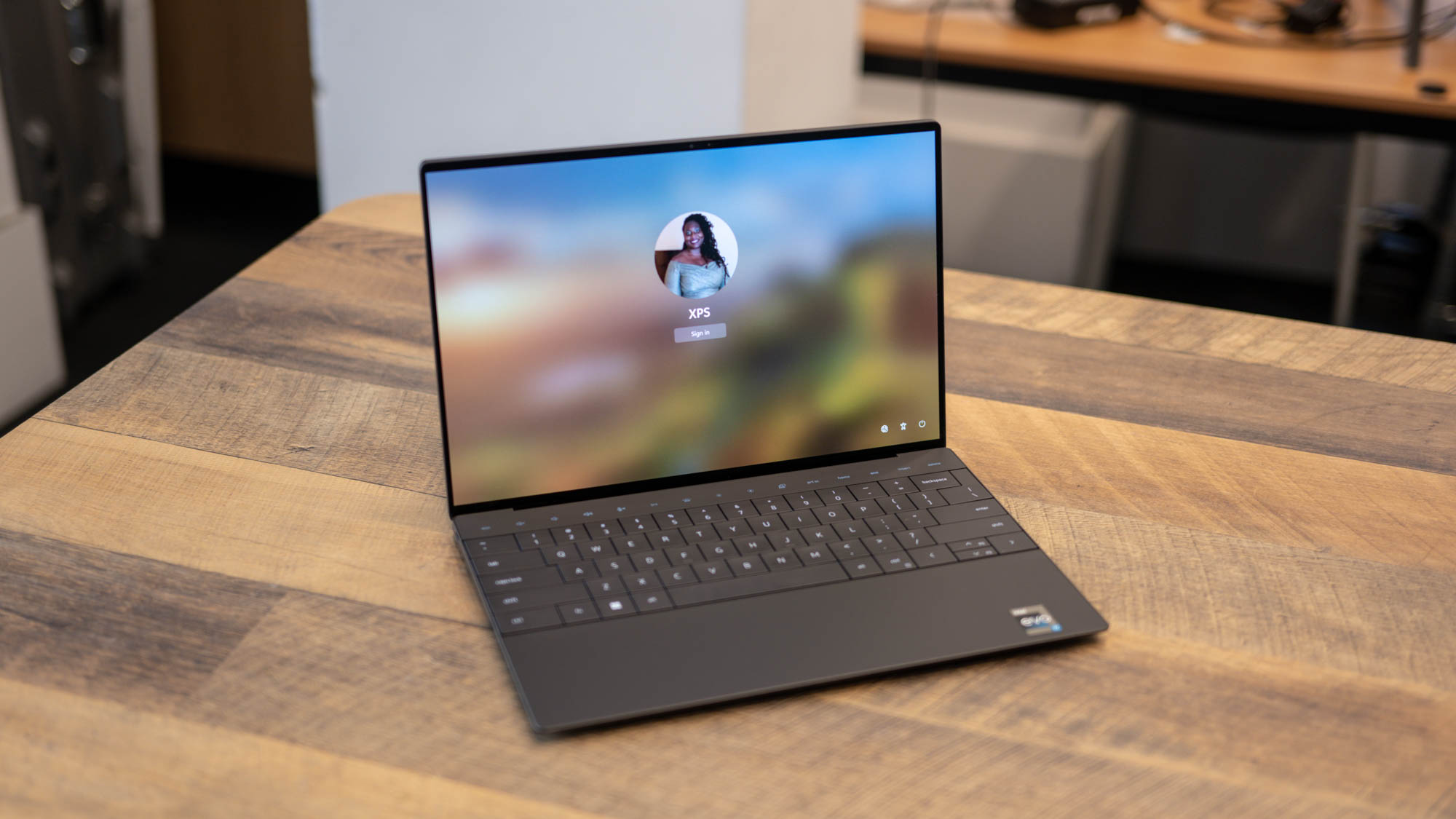
The Dell XPS 13 Plus ships with a one-year premium service warranty. See how Dell fared during Tech Support Showdown and Best and Worst Brands, our annual special reports.
Bottom line
Are you ready for the future? Dell certainly is, and for them, the future is the XPS 13 Plus. Although the laptop sports an incredibly minimalistic and polarizing design, it doesn’t skimp in the power department — thanks to its Core i7 processor. The 4K OLED display is a vision of loveliness and the keyboard is comfortable, which just serves to sweeten the pot.
However, as beautiful as the display is, it’s also a drain on the battery life. And then there’s that polarizing design. Some, like myself, will be drawn to the ultra-minimalistic aesthetic while others will take issue with the invisible touchpad and absent headset jack. Those looking for a more traditional take on the laptop should check out the $1,549 Acer Swift 5. If you’re team Apple, the $1,899 MacBook Air M2 is the way to go. But if you’re looking for a piece of the future right now, then the $1,910 ($1,273 starting) Dell XPS 13 Plus is for you.

Sherri L. Smith has been cranking out product reviews for Laptopmag.com since 2011. In that time, she's reviewed more than her share of laptops, tablets, smartphones and everything in between. The resident gamer and audio junkie, Sherri was previously a managing editor for Black Web 2.0 and contributed to BET.Com and Popgadget.


